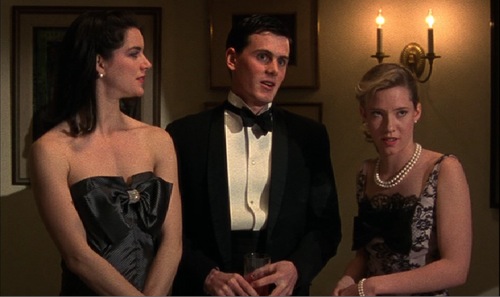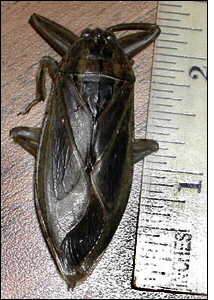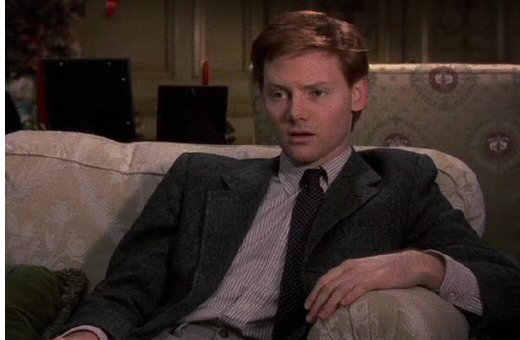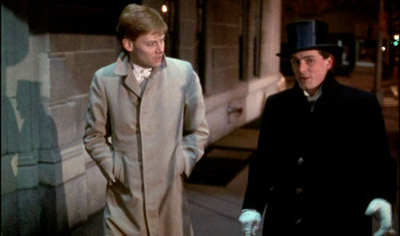
THE WHOLE HISTORY OF MY LIFE

METROPOLITAN
page 2
christopher funderburg
I chose New Orleans because my parents had moved to the North Shore of Lake Pontchartrain* and I felt like I needed to repair my relationship with them, even if I didn't have any clear idea what that meant or even what was broken. I think I would've moved home, but since I had moved around so much growing up (born in Virginia, then from Virgina to Louisiana to Pennsylvania to Nashville back to outside of Philadelphia to New York for college) that "home" was an entirely abstract concept. I worked about 60 hours a week, but I could do the copy editing any time I wanted, so I would frequently sleep for a couple hours and then wake up at 1:00a.m. to review the political science journals sorely in need of subject/verb harmony. The video store in which I worked was part of a strip mall anchored by a massive grocery store - but, the grocery store was still under construction and the video store was hidden by scaffolding and piles of dirt, so no one even knew we were open. I would go in for my shift in the morning and stand around doing literally nothing because we would have at best 3 customers in 8 hours and my boss was a former soldier who insisted I neither sit down nor read a magazine, so I would just stand there staring off into space or wandering the aisles looking for boxes in need of the slightest flushing. Belligerent kids would come in from the housing projects nearby and accuse me of watching them too closely like I thought they were shop-lifting, but seriously you fucking retards, do you think I give a shit whether you steal from this place? I happened once a week: there was one kid who would always bark at me "You got something wrong with your eye?" Kid, just steal the video games and let's get on with our day. I would stare off into space.
 That was the frustration of my time in New Orleans: I didn't believe in school, but I didn't know where I wanted to be. I wanted to follow in the footsteps of my cinematic heroes and fuck it all to make my own movie, but just about the only bit of wisdom I had acquired was the knowledge that I simply had no business making a movie. The two films I had made at Purchase sucked so very bad and I didn't have any ideas for my next film that I couldn't see from a mile away were terrible. I often thought of the Hal Hartley quote, "At film schools, you have all these kids from the suburbs who are writing gangster films that take place in the city. And that's so far removed from them... They should be writing stories about sitting on their couch watching gangster films." My ideas all had guys running around with guns. But I didn't have anything else up my sleeve and I didn't know what else to do. So I sat in my hot apartment, swatting Palmetto bugs, correcting the grammar of political scientists and reading. I read a lot that year. In New Orleans, I found Milan Kundera (by way of Steve Martin's Pure Drivel, natch) and read all his work. From Kundera, I went to Witold Gombrowicz and Hermann Broch, from those guys to Thomas Mann and Francois Rabelais. Denis Diderot became my favorite. A friend from high school recommended William Saroyan and I would read my favorite three Saroyan short stories (Many Many Miles per Hour, Sweetheart Sweetheart Sweetheart and The Man with His Heart in the Highlands**) over and over. Walker Percy's The Moviegoer felt like an alternate reality autobiography in which I was Catholic and ok with the stupid epilogue. I read Anna Karenina and thought for a long time about Kundera's analysis of her suicide. I didn't make a single new friend my entire time in the crescent city and realized that there was something wrong with me, that my personality alienated everyone around me and that I mainly made folks uncomfortable. I used to eat a fern-bar near the video store and sit around by myself reading - at one point a waitress asked me "Why do you always come in here by yourself and read?" Apparently, that's something crazy to do. Another time, a co-worker mentioned that she had seen me in the lobby of a movie theater by myself sitting around reading. Why was I doing that? Because there's an hour in between the two movies I'm seeing, you monster. I got seriously out of whack - or as out of whack as a stridently straight-edge, earnest 20 year old can get - at one point I went to the movies on a Friday morning and attempted to buy a ticket for Deuce Bigelow, Male Gigolo even though it didn't open for another week. It's not that I was confused about when the film opened, it was that I was confused about what week it was. I slept in my car for no reason and broke down crying as I read the final section of The Sleepwalkers in a mall in Kenner. My sleeping hours were erratic and based on nothing. I went for 3 days once without speaking just to see how difficult it would be. It wasn't.
That was the frustration of my time in New Orleans: I didn't believe in school, but I didn't know where I wanted to be. I wanted to follow in the footsteps of my cinematic heroes and fuck it all to make my own movie, but just about the only bit of wisdom I had acquired was the knowledge that I simply had no business making a movie. The two films I had made at Purchase sucked so very bad and I didn't have any ideas for my next film that I couldn't see from a mile away were terrible. I often thought of the Hal Hartley quote, "At film schools, you have all these kids from the suburbs who are writing gangster films that take place in the city. And that's so far removed from them... They should be writing stories about sitting on their couch watching gangster films." My ideas all had guys running around with guns. But I didn't have anything else up my sleeve and I didn't know what else to do. So I sat in my hot apartment, swatting Palmetto bugs, correcting the grammar of political scientists and reading. I read a lot that year. In New Orleans, I found Milan Kundera (by way of Steve Martin's Pure Drivel, natch) and read all his work. From Kundera, I went to Witold Gombrowicz and Hermann Broch, from those guys to Thomas Mann and Francois Rabelais. Denis Diderot became my favorite. A friend from high school recommended William Saroyan and I would read my favorite three Saroyan short stories (Many Many Miles per Hour, Sweetheart Sweetheart Sweetheart and The Man with His Heart in the Highlands**) over and over. Walker Percy's The Moviegoer felt like an alternate reality autobiography in which I was Catholic and ok with the stupid epilogue. I read Anna Karenina and thought for a long time about Kundera's analysis of her suicide. I didn't make a single new friend my entire time in the crescent city and realized that there was something wrong with me, that my personality alienated everyone around me and that I mainly made folks uncomfortable. I used to eat a fern-bar near the video store and sit around by myself reading - at one point a waitress asked me "Why do you always come in here by yourself and read?" Apparently, that's something crazy to do. Another time, a co-worker mentioned that she had seen me in the lobby of a movie theater by myself sitting around reading. Why was I doing that? Because there's an hour in between the two movies I'm seeing, you monster. I got seriously out of whack - or as out of whack as a stridently straight-edge, earnest 20 year old can get - at one point I went to the movies on a Friday morning and attempted to buy a ticket for Deuce Bigelow, Male Gigolo even though it didn't open for another week. It's not that I was confused about when the film opened, it was that I was confused about what week it was. I slept in my car for no reason and broke down crying as I read the final section of The Sleepwalkers in a mall in Kenner. My sleeping hours were erratic and based on nothing. I went for 3 days once without speaking just to see how difficult it would be. It wasn't.
Any idea of what I wanted or was trying to accomplish became dimmer and dimmer. I loved the city of New Orleans, but had failed to even slightly become a part of it. I had no idea where I wanted to be or where I wanted to go. I thought about the Saroyan story Aspirin is a Member of the NRA, which is basically a little autobiographical rant about his time in New York City. He would sit in the cold of his tiny attic apartment, smoking cigarettes and dreading going outside into the harsh gray day. I thought about how my life was the inverse: aching to get out of my humid little attic apartment, still dreading to face the harsh gray days. Saroyan couldn't stand the thought of grabbing a cup of coffee from the automat and diving down into the subway, just trying to get out of freezing cold as soon as possible. He wanted to go home to California and its blue skies. I didn't have a California. I spent most of my time wandering and thinking about what I should do after I saved up a little money. I rode the streetcar up and down St. Charles for hours at a time or would spend all day in the Canal Place Cinema watching the same movie over and over. Even though Whit Stillman made his last film in 1998 and Hal Hartley stopped resembling himself at roughly the same time, I still went to the movies. I thought about what film I could make for $27,000 that would allow me to make a follow-up film for a subsidiary of the Universal Pictures company. I felt completely in control of my life, but nothing felt possible. I sometimes fantasized that a drill sergeant would wake me up at reveille and force me to do push-ups, force me to have some structure and purpose to my life, a structure and purpose beyond my control or understanding. I read. I wandered. After a while, I stopped thinking about my future. I'm not sure I was ever trying to make friends, but I had the solid awareness that I probably couldn't. And then sometime during the week between Christmas and New Year's Eve in 1999, after I had been in the city for 8 months, I woke up in my sweat-soaked sheets, called in sick to work for no reason and put my dubbed tape of Metropolitan in the vcr. Whit Stillman's film follows a group of wealthy Manhattanites as they meander their way through the party season running from Christmas to New Year's Eve; a middle-class guy gets sucked into their orbit and does his best to fit in. As per usual, Chris Eigman plays a gigantic jerk. There are jokes about a specific 19th century agrarian Socialist.
 "The acid test is whether you take any pleasure in responding to the question 'What do you do?' I can't bear it." A random drunk in a high class bar says that to the main characters late in the film. And there's no question I hated as much. God, that question killed me for smashing my fantasy answer ("I'm a filmmaker!") violently up against reality ("I do nothing worth mentioning.") The film weaved its way about my mental landscape in such a fashion that seems almost impossibly coincidental in retrospect: the main character (Edward Clements), in his second year in college, struggles to fit into the world of which he would most like to be a part; he attempts to use intellectualism to stake a moral high ground and build a solid identity, but just ends up isolating himself and alienating those around him. It provided a checklist of ironic and absurdly funny quotes that mirrored my own life: in New Orleans for vague reasons having to do with a dysfunctional relationship with my parents? "The most important thing to realize about parents is that there is absolutely nothing you can do about them." A waitress making me uncomfortable for reading alone? "Snobbery is looked down upon." And, man, I just couldn't do better than Chris Eigman's throwaway line "I've always expected to be a failure anyway, that's why I plan to marry an extremely wealthy woman." The setting, the characters, the jokes, New York City, Christmas and New Years, an impenetrable world and an uncertain future. "For me, ceasing to exist is failure. I mean, that's pretty definitive." Wandering around New Orleans I verged on at any moment ceasing to exist. But really, none of this sent my life spiraling off in any unexpected directions. It primed my mental pump for the actual moment of epiphany without actually contributing to it. My moment of revelation was strangely contentless, flowing into an intellectual void which only could have been opened by those refractions and reflections of where I was, of who I was. Anything I did was not because of some insight, was not because of these things, it was not an intellectual result of some special understanding of my life or myself that Metropolitan had given me. Metropolitan somehow opened a mental or emotional or otherwise door and through that opening a decision slipped.
"The acid test is whether you take any pleasure in responding to the question 'What do you do?' I can't bear it." A random drunk in a high class bar says that to the main characters late in the film. And there's no question I hated as much. God, that question killed me for smashing my fantasy answer ("I'm a filmmaker!") violently up against reality ("I do nothing worth mentioning.") The film weaved its way about my mental landscape in such a fashion that seems almost impossibly coincidental in retrospect: the main character (Edward Clements), in his second year in college, struggles to fit into the world of which he would most like to be a part; he attempts to use intellectualism to stake a moral high ground and build a solid identity, but just ends up isolating himself and alienating those around him. It provided a checklist of ironic and absurdly funny quotes that mirrored my own life: in New Orleans for vague reasons having to do with a dysfunctional relationship with my parents? "The most important thing to realize about parents is that there is absolutely nothing you can do about them." A waitress making me uncomfortable for reading alone? "Snobbery is looked down upon." And, man, I just couldn't do better than Chris Eigman's throwaway line "I've always expected to be a failure anyway, that's why I plan to marry an extremely wealthy woman." The setting, the characters, the jokes, New York City, Christmas and New Years, an impenetrable world and an uncertain future. "For me, ceasing to exist is failure. I mean, that's pretty definitive." Wandering around New Orleans I verged on at any moment ceasing to exist. But really, none of this sent my life spiraling off in any unexpected directions. It primed my mental pump for the actual moment of epiphany without actually contributing to it. My moment of revelation was strangely contentless, flowing into an intellectual void which only could have been opened by those refractions and reflections of where I was, of who I was. Anything I did was not because of some insight, was not because of these things, it was not an intellectual result of some special understanding of my life or myself that Metropolitan had given me. Metropolitan somehow opened a mental or emotional or otherwise door and through that opening a decision slipped.
It's very strange to think that the whole history of my life was changed by skipping work and throwing on a fuzzy v.h.s. dub by an m.i.a. filmmaker important in a dimming past. I often wonder if things would have still turned out the same way if I had, say, watched Hal Hartley's Simple Men, which was on the same tape. Would I have never had the epiphany that sent me back to New York City where I live happily to this day? I think most people would like to believe the major decisions they make in life have two key components: rationality and coherency. I can honestly say this decision had neither. My decision was based on one moment, one shot in Metropolitan. It's such a simple moment, that it's almost stupid: Chris Eigman and Edwards Clements walking down a Manhattan street. They're bundled up in their heavy coats, shuddering from the cold and hurrying to the next party. In that moment I thought, "Yes. That's where I want to be: decked out in my heavy coat, hurrying down the streets of Manhattan to someplace warm." In the opposite of Saroyan's story, I want to go out into the freezing cold, to grab a cup of coffee from the automat and dive down into the subway; that's what I want. I like parties. I like wealth. I like the cold. I like 5th avenue in the winter packed with crowds and adorned with all manner of Christmas lights. My decision lacked rationality and it lacked coherency. It was a feeling and an idea from a feeling and a movement in my feet and mind and in my arms based on nothing beyond an impulse. But a certainty. An inarguable impulse. That scene, that moment of the characters walking down the street in the cold, made me sure of where I wanted to be. And it wasn't rotting away in the heat of a New Orleans Christmas, working in a video store and saving up pennies for a rainy day. I wanted to go back to New York. And I knew I wasn't good enough to make a film, so I wanted to go back to Purchase and learn something for once. I needed focus. I needed an education. I needed to stop alienating everyone around me. That's where I wanted to be. From that moment forward, everything I did was to prepare myself for going back to study film and live in New York City - I'm still moving towards the things I suddenly wanted on that day, I am still in motion towards the focus of that moment, I still remember the failures and fears of that time, I still never feel better than when the temperature drops, I take my big black coat out of storage and hurry through the freezing cold from dinner downtown into a movie at Film Forum. Did Metropolitan really make me into the person I am today? Whats does it mean that Whit Stillman has disappeared and movies like his feel like projections from a distant past? If Whit Stillman is not here today, where will I be tomorrow?
* You might recognize Lake Pontchartrain from Lucio Fulci's The Beyond, where the long, flat 24-mile bridge running across it is featured memorably!
** The title of this series actually comes from The Man with his Heart in the Highlands: "Jasper played a song so beautiful that it changed the whole history of Tom's life."

- christopher funderburg
december 10, 2010
RELATED ARTICLES
<<Previous Page 1 2 Next Page>>
home about contact us featured writings years in review film productions
All rights reserved The Pink Smoke © 2010